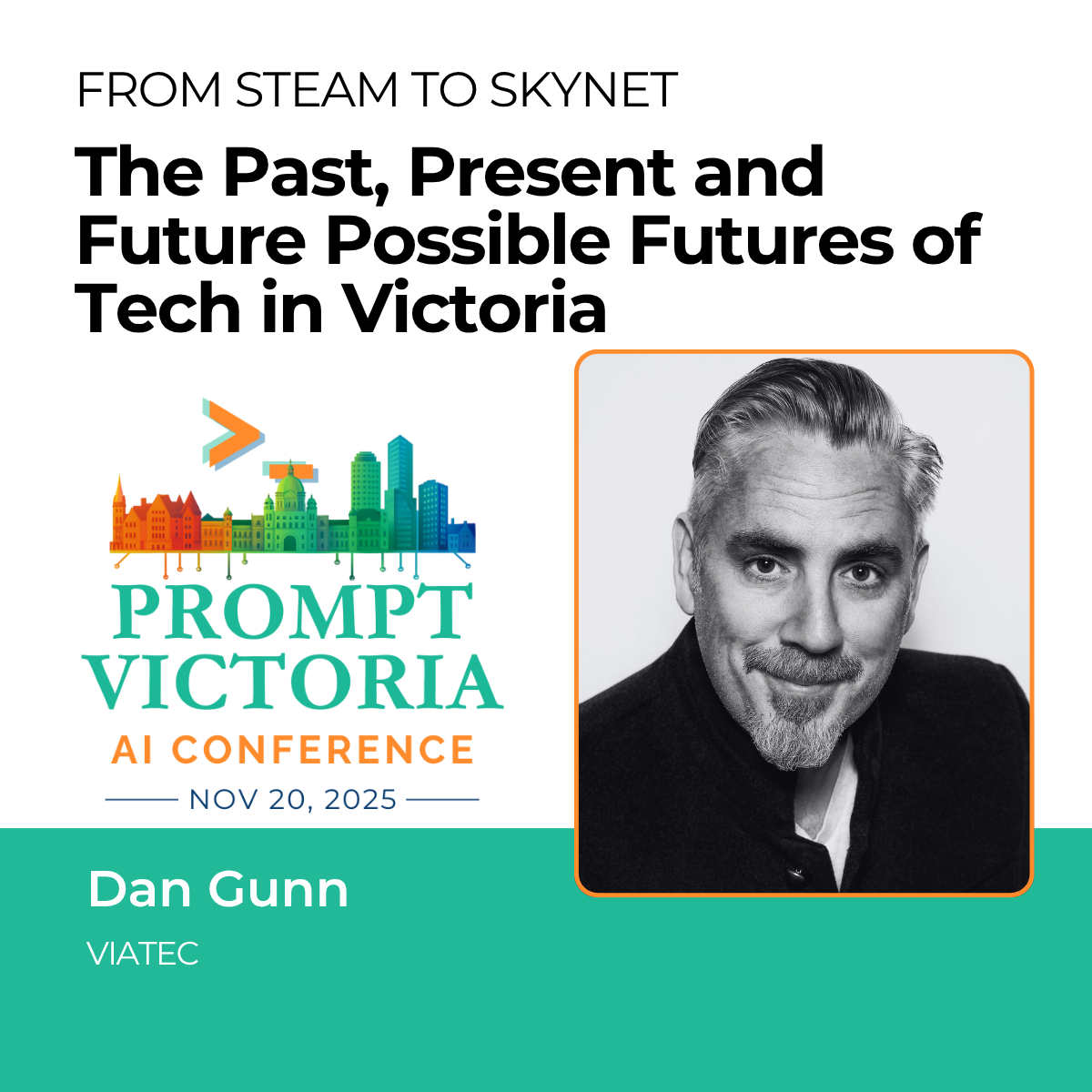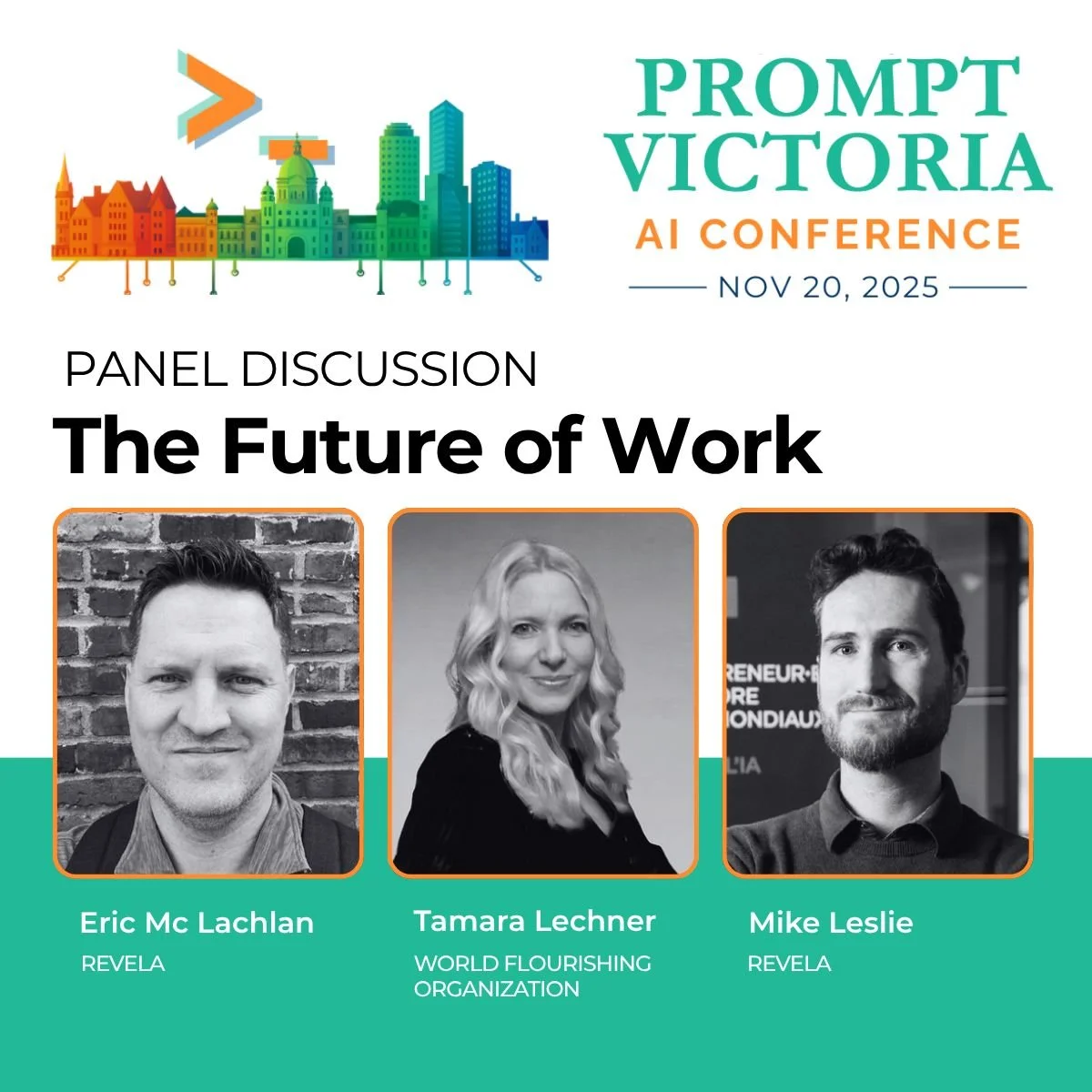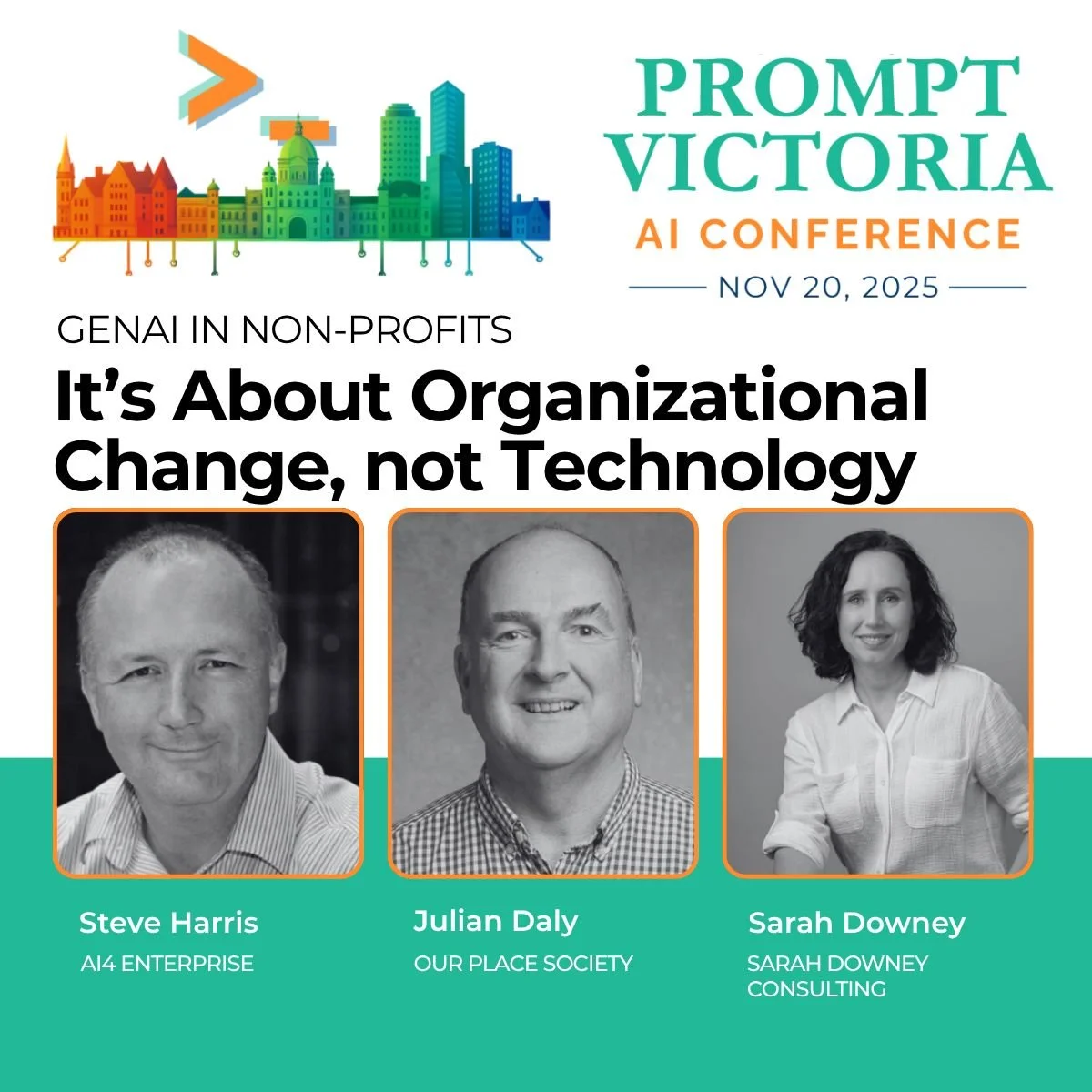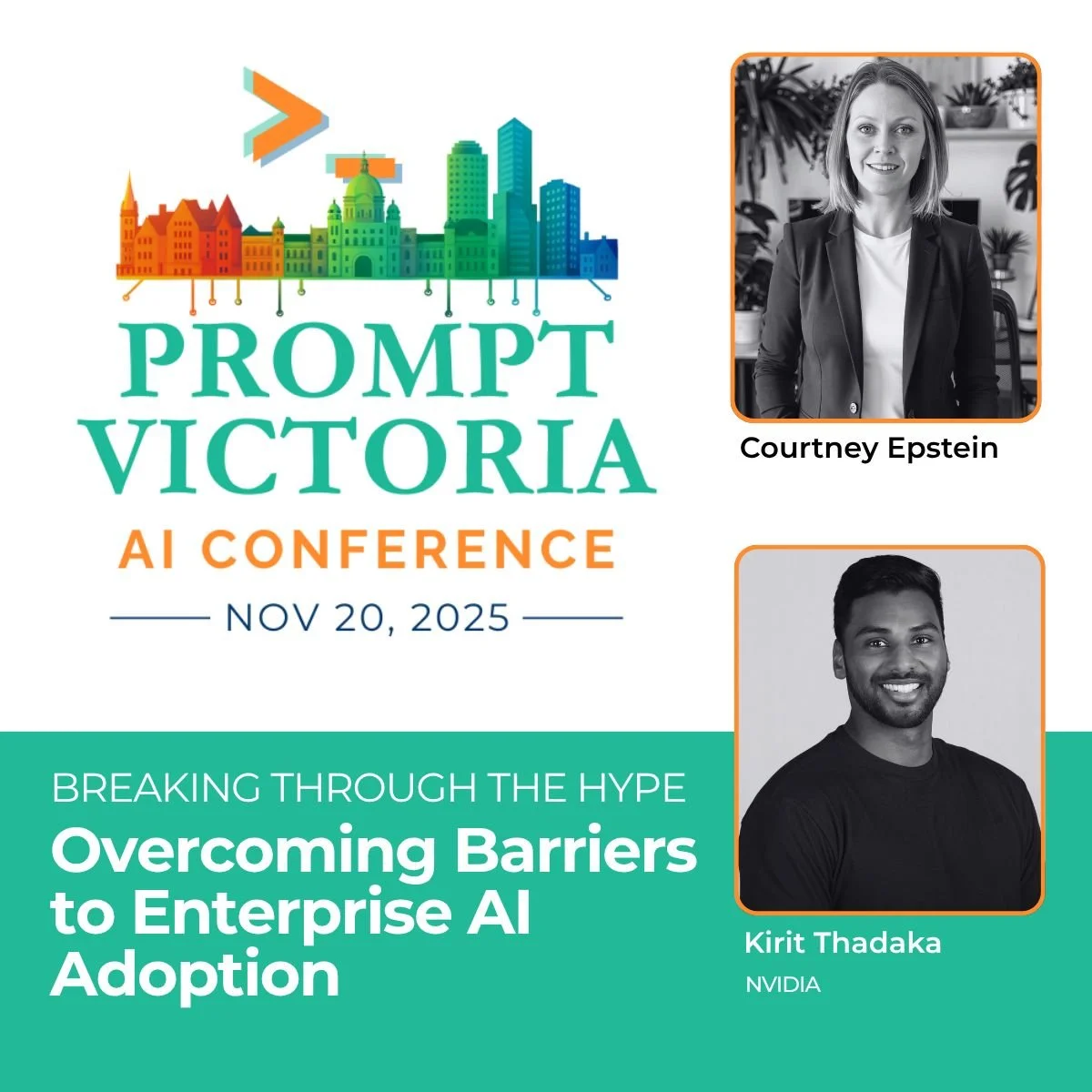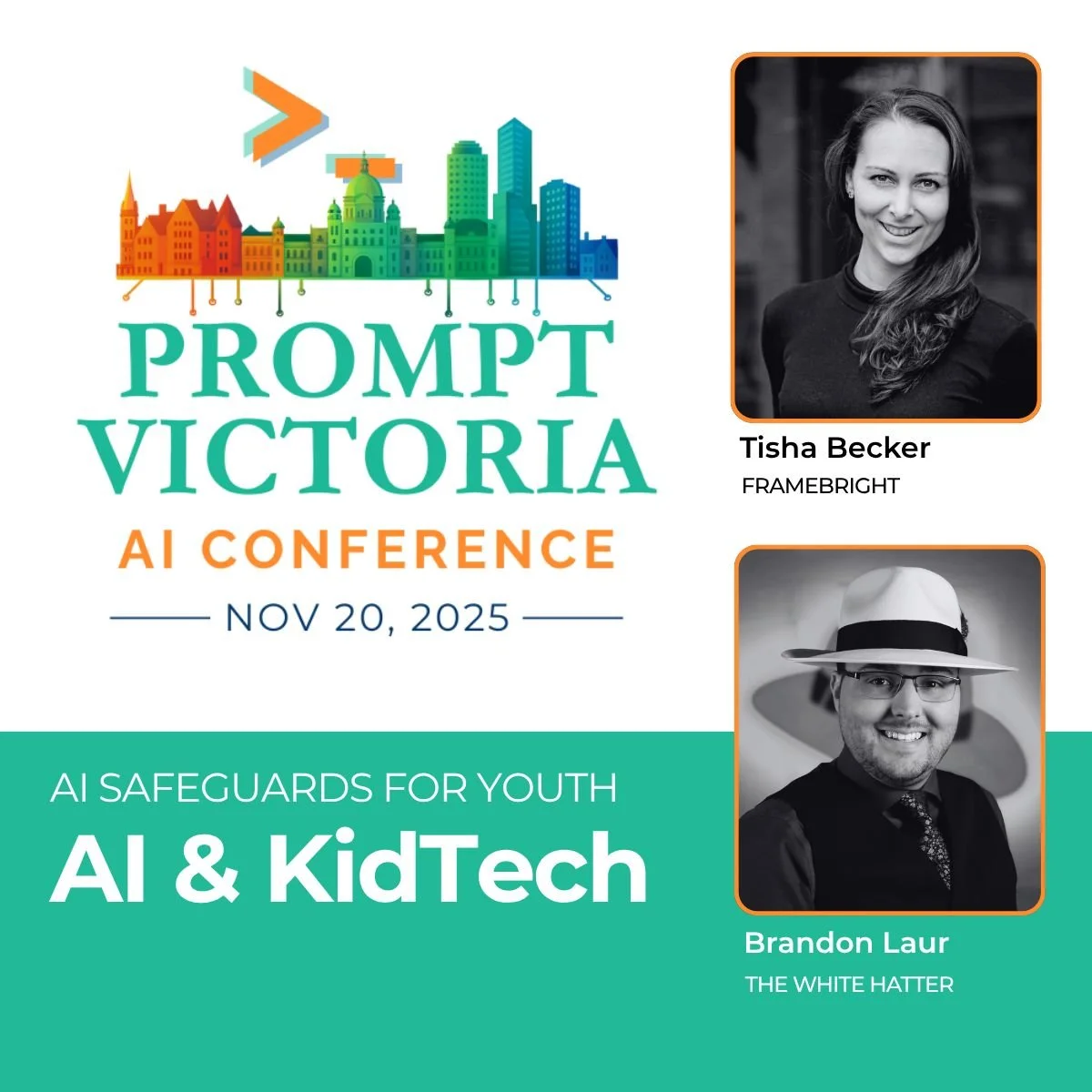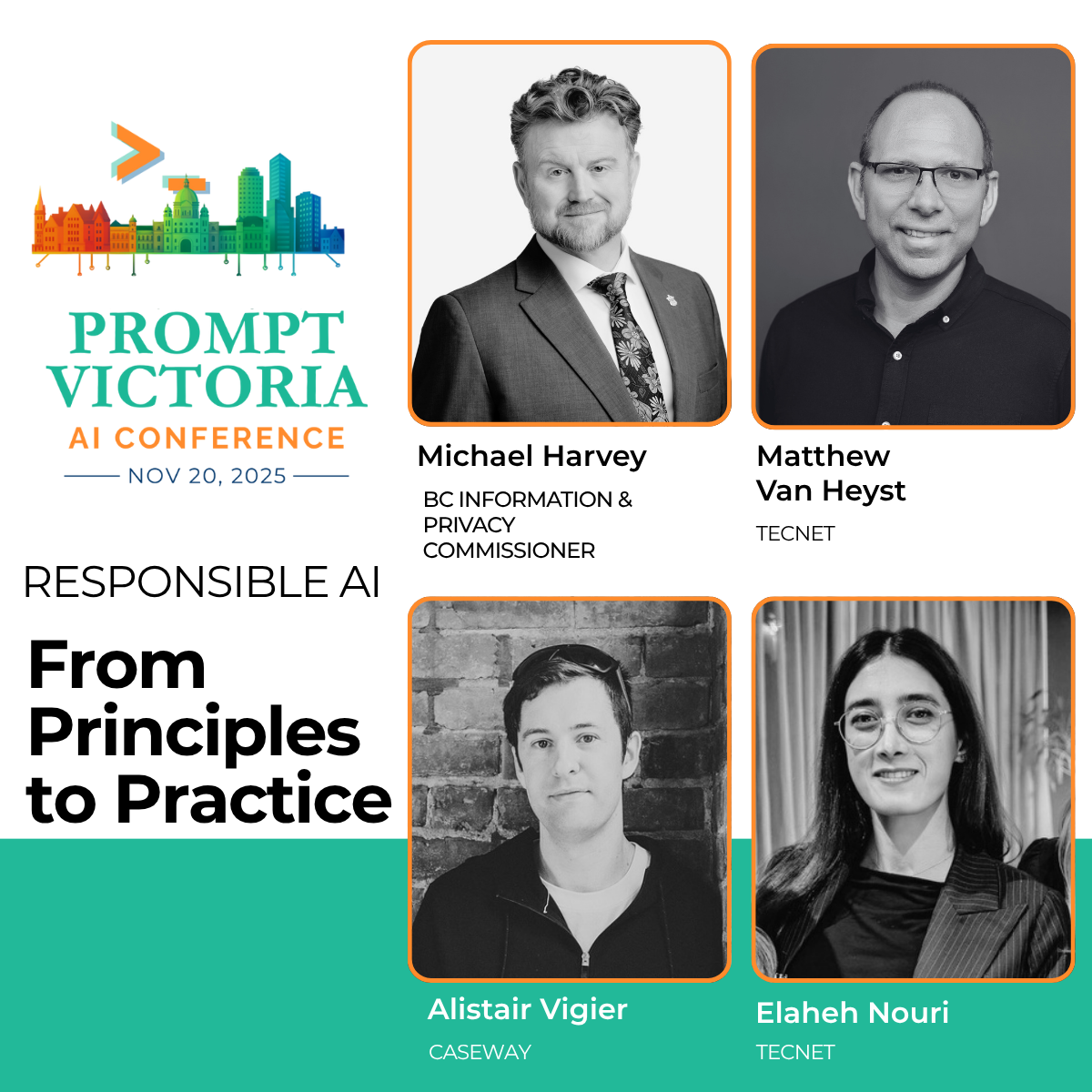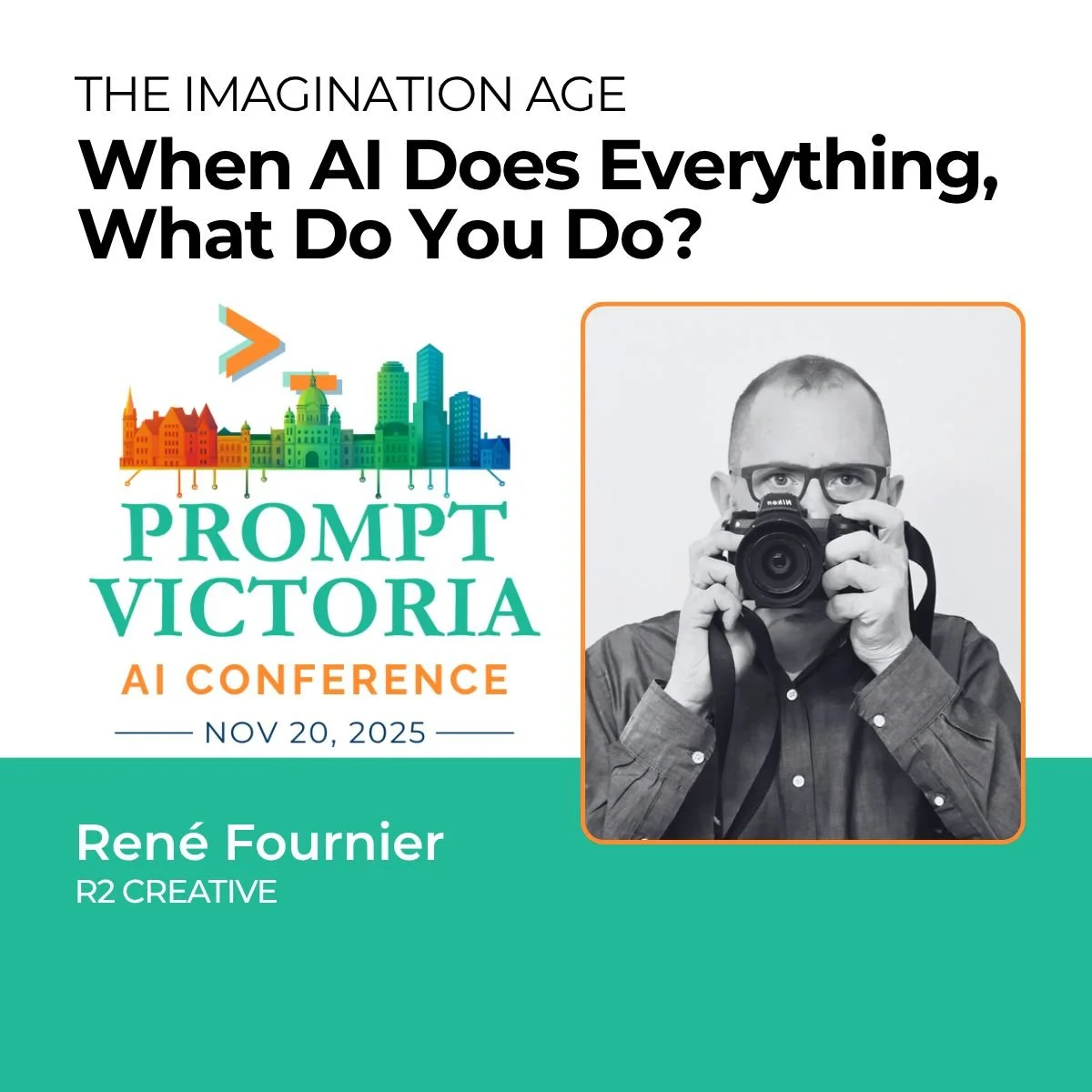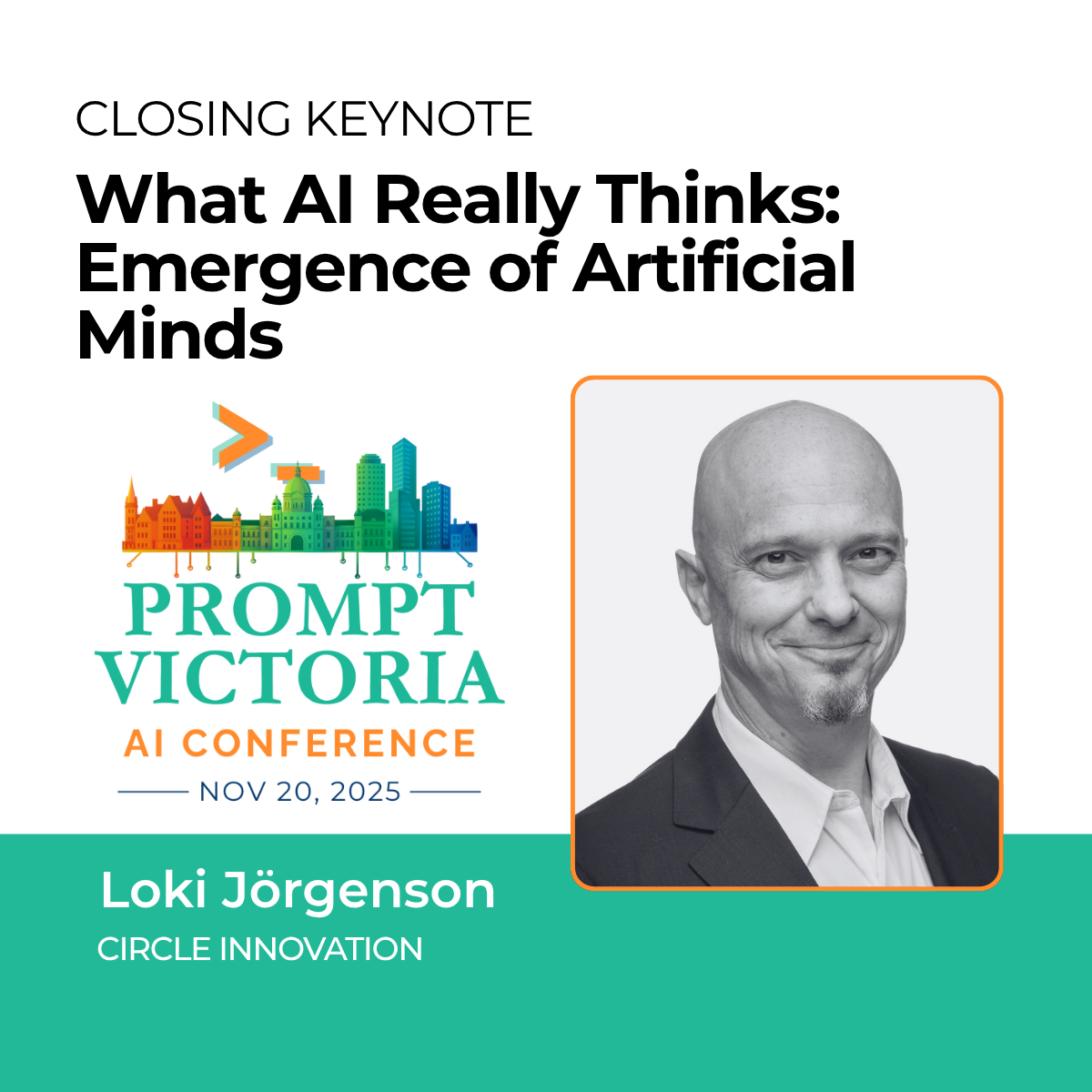Session Descriptions
Welcome & Opening Keynote - Lecture Theatre (9:00am - 10:00am)
Coffee (10:00am - 10:15am)
The Future of Work - Lecture Theatre (10:15am - 11:05am)
GenAI in Non-Profits - Oak Bay A (10:15am - 11:05am)
AI Hacks & Side Quests - Oak Bay B (10:15am - 11:05am)
Breaking Through the Hype - Lecture Theatre (11:15am - 12:00pm)
Building Safe, Trusted, and Effective AI in EduTech - Oak Bay A (11:15am - 12:00pm)
Software Development Best Practices - Oak Bay B (11:15am - 12:00pm)
A Whole of Society Approach to Addressing Cybercrime - Lecture Theatre (1:30pm - 2:20pm)
Writing Authentically in Your Own Voice - Oak Bay A (1:30pm - 2:20pm)
AI and Our KIds - Oak Bay B (1:30pm - 2:20pm)
Responsible AI - From Principles to Practice - Lecture Theatre (2:30pm - 3:20pm)
The Imagination Age - Oak Bay A (2:30pm - 3:20pm)
AI vs AI: When Cyber Attackers and Defenders Have Agents - Oak Bay B (2:30pm - 3:20pm)
What AI Really Thinks: Emergence of Artificial Minds - Lecture Theatre (3:45pm - 4:45pm)
Lecture Theatre (9:00am - 10:00am)
From Steam to Skynet: The Past, Present and Possible Futures of Tech in Victoria - Opening Keynote
Dan Gunn, VIATEC
This keynote takes a wide‑angle look at how technology has shaped Victoria so far, what’s changing right now, and how AI might influence what comes next. Using Victoria’s own story as a backdrop, from older industries through to today’s digital and AI‑driven world, it opens up questions about jobs, community, innovation and identity, without pretending we have all the answers yet.
Dan Gunn is CEO of VIATEC (Victoria Innovation, Advanced Technology and Entrepreneurship Council), the hub for Greater Victoria’s technology community. For more than two decades he has helped grow the region’s tech sector into its leading industry and a multi‑billion‑dollar economic engine. A former entrepreneur and one‑time Georgina city councillor, Dan is known for his “Magnetic City” vision and for blending creativity, community and unconventional events to support local founders.
Lecture Theatre (10:15am - 11:05am)
The Future of Work - Panel
Moderated by Rob Cooper, PlusROI
Eric McLachla, Revela
Tamara Lechner, World Flourishing Organization
Mike Leslie, Revela
AI is reshaping how we work - creating opportunities while raising critical questions about jobs, skills, and leadership in this new era.
Will information workers and developers still have jobs? How do leaders manage hybrid human-AI teams? What steps can we take now to ensure an equitable future?
Join us as three experts share practical insights from different vantage points in the AI transformation. You'll leave with food for thought and concrete strategies for adapting your approach to work in an AI-driven world.
Eric McLachlan is a software engineer focused on dealing with the scale of information we have at our disposal. He’s gone through significant career change since starting to write code in 1995 and has profound insights on what it might mean to be a developer in the coming years.
Tamara Lechner is a "people person" with experience as a founder, consultant, speaker, writer, and coach. As Chair of the AI for Human Flourishing think tank within the Harvard Human Flourishing Program, Tamara leads initiatives exploring how AI can be harnessed to enhance our ability to thrive in today's rapidly evolving technological landscape.
Mike Leslie has over a decade of executive and senior management experience in the technology sector. As Co-Founder and CEO of Revela, he leads the creation of best-in-class AI products for the planet’s most ambitious startups.
Oak Bay A (10:15am - 11:05am)
GenAI in Non-Profits – It’s About Organizational Change, not Technology - Lightning Talk
Steve Harris, AI4 Enterprise
Julian Daly, Our Place Society
Sarah Downey, Sarah Downey Consulting
Implementing Generative AI is not primarily a technology initiative, it’s an exercise in organizational change. This session takes participants on a journey from strategy to implementation. Julian Daley (CEO) opens with the realities and challenges non-profits face today. Sarah Downey follows with guidance on maintaining organizational values and trust in the face of AI. Steve Harris concludes with the practical side - how to implement Generative AI and realize tangible results. Together, they show that GenAI adoption is less about technology and more about organizational change.
Session outcomes:
Insight into the realities of and challenges of running a non-profit.
Guidance on developing AI policies that build trust across teams and stakeholders.
Strategies for ethical change leadership during AI adoption.
Examples of values-aligned AI practices that strengthen organizational culture.
Practical examples and KPI’s from GenAI use in the field.
Lessons learned from GenAI use in non-profits.
Julian Daley, CEO, Our Place Society. Born in Ireland, Julian has over 30 years' experience working in non-profit, government and private sectors in Canada, the UK, Indonesia, and his country of birth. The vast majority of his working life has been spent working at the margins of society -- in particular, in the inner-city communities of London, UK, and Edmonton, Alberta and now Victoria where he has been the CEO of Our Place since 2020 - seeking to achieve some degree of social justice for those served through a combination of practical, needs-based programming and advocacy. He has been a frontline worker, manager and CEO in a wide range of programs and projects over the years, which have included housing, poverty reduction, community engagement, HIV/AIDS, harm reduction and recovery, the differently abled, employment, youth services, social enterprises, health, education, and children and family services.
Sarah Downey, Sarah Downey Consulting, is a consultant who helps nonprofits adopt AI in ways that are ethical, human-centered, and aligned with their mission. With two decades in the nonprofit sector, including serving as Executive Director at three Canadian charities, Sarah brings lived insight into the challenges leaders face. She specializes in policy development, team education, and change leadership around emerging tech. With a deep understanding of nonprofit dynamics and ethical tech adoption, Sarah brings a grounded, values-first approach helping organizations navigate uncertainty, build trust, and use new tools responsibly.
Steve Harris, AI4 Enterprise, is the Founder of AI4 Enterprise, a Victoria-based consulting practice helping organizations unlock the potential of Generative AI through strategy, governance, and practical implementation. With over 35 years in technology - including technical, project, director and executive leadership roles - Steve combines deep experience with AI certifications from Microsoft, AWS, Google, and IBM. His work focuses on GenAI adoption, readiness assessments, and implementation frameworks. An active community builder, he co-founded the VIATEC AI Meetup and is a frequent speaker on AI’s role in business transformation, Steve helps both commercial and social-profit organizations harness AI responsibly for efficiency, innovation, and impact. (Steve is easily distracted by conversations about mountain bikes and bouldering.)
Oak Bay B (10:15am - 11:05am)
AI Hacks & Side Quests - Lightning Talk
Nat Knight, Data Engineering Consultant
Tariq Chatur
Anu Jolliffe, Victoria Data Society & Equifaira Partners Inc.
“Embeddings” are mathematical representations of data (text, images, etc.). They’re a central concept in AI and machine learning, but they have lots of other applications! In this session I’ll talk about two particular systems I built using embeddings: a de-duplicating cache to make common LLM queries quicker, and an image database that provides a ‘text-to-image’ interface over a curated corpus of human-made imagery.
Artificial Green Thumb, using Reinforcement Learning in Flora // Have you had the privilege of learning to care for houseplants? It starts with research, observation, consistency, and constantly learning from our mistakes. This is reinforcement learning, we are able to do it with our eyes, and hands. Wouldn’t an AI with access to much better observation tools be able to learn to care better? In this session I will showcase an AI I have built that allows me to communicate with my plants and create an artificial green thumb.
The 5-in-1 GenAI Swiss Army Knife // Discover how Microsoft 365 Copilot serves as a versatile generative AI tool...your digital Swiss Army knife for productivity. In this lightning talk, we'll explore how Copilot seamlessly integrates five powerful capabilities: Chat, Search, Agents, Notebooks, and Create. Learn how each function empowers users to streamline workflows, and unlock new levels of efficiency across a modern work ecosystem.
Outcomes:
Learn what embeddings are and the different kinds of embeddings
Understand different applications of embeddings (and hopefully dream up your own!)
A novel understanding of reinforcement learning that they can do themselves at home
Insights on practical uses of reinforcement learning in AI development
A better understanding of mindfulness, and conscientiousness with an introduction to plant care
Understand the five core capabilities of Microsoft 365 Copilot.
See how Copilot can transform productivity and decision-making in everyday workflows.
Learn how Copilot supports secure, compliant, and responsible AI use across the enterprise
Nat Knight (he/him) has been writing software since Python 2 roamed the Earth (i.e. the mid-to-late noughties). He’s worked on projects for doing astronomy, taxes, treating HIV, trading energy with California, and more. He has worked with generative models since before ChatGPT, integrating it into apps, building realtime voice coaches, and collaborating on code.
Tariq Chatur (he/him), an AI and Automation Developer for the Government of British Columbia, has dedicated his life to the use of automation and education to improve the lives of as many people as possible. In his journey to complete his goal,he has contributed to many large public service projects, most recently to win IPAC’s Innovation Award for network management, and in his personal development receiving the Government of British Columbia’s Coop Supervisor Award. Outside of his professional career, he finds himself lost in the beauty of creation through his travel photography, game development, and fashion design.
Anu Jolliffe is a technology innovator with more than 35 years of experience leading digital transformation. Anu’s career spans bringing Internet access to the Gulf Islands in the 90s, pioneering online sales platforms before eBay existed, and launching a vacation rental web platform 10 years before Airbnb. Known for staying ahead of the curve, Anu champions technology adoption built on trust, timing, and empathy…believing that true innovation solves real problems and starts with listening to users. Throughout Anu’s journey, the focus has always been on making technology feel like progress, not pressure, and aligning IT with business strategy to deliver practical, human-centered solutions. Anu began exploring generative AI in 2022 and has dedicated the last two years to working extensively within the Microsoft AI ecosystem. The focus of this experience has been on leveraging the modern work capabilities offered by Microsoft 365 Copilot.
Lecture Theatre (11:15am - 12:00pm)
Breaking Through the Hype: Overcoming Barriers to Enterprise AI Adoption
Courtney Epstein
Kirit Thadaka, NVIDIA
Generative AI offers enormous potential for businesses, but deploying it at scale requires more than just technology. In this session, we’ll explore practical strategies for overcoming common barriers, including integration, organizational alignment, and risk management. A case study will illustrate how AI can improve data quality and drive business outcomes.
Participants will gain:
Actionable insights from real-world experience in building and adopting AI solutions in enterprise settings.
Courtney Epstein has spent the past decade applying machine learning and AI to help enterprises, governments, and social impact organizations achieve their goals. She leads teams of engineers building intelligent applications aligning technical architecture with organizational readiness and business impact. Drawing on her experience in consulting and applied machine learning, Courtney helps teams deploy generative AI in practical and achievable ways.
Kirit Thadaka is an AI practitioner with over a decade of experience as a builder, advisor, and product lead. Kirit is passionate about unlocking value through AI in a socially responsible way. Having worked across startups and larger companies like AWS and Nvidia, Kirit has expertise in bringing enterprises success with AI.
Oak Bay A (11:15am - 12:00pm)
Building Safe, Trusted, and Effective AI in EduTech - Lightning Talk
Tim Chipperfield, Thinkific
Mandla Moyo, NoRedInk
//AI is changing the way we teach and learn. The most important feature of any AI product isn’t novelty, it’s trust. I’ll share the story of building Thinker, our AI Teaching Assistant, from early design tradeoffs through deployment, including what worked and what failed. You’ll see how technical and process choices shaped trust, and we’ll step back to consider which lessons apply beyond education to other industries.
// SAFE AI in Education: A Practical Plan of Action: For AI pipelines in highly sensitive contexts like education, broken trust is your biggest liability, so safety should be one of your biggest priorities.
Most AI safety failures aren’t mystical hallucinations - they come from predictable, manageable gaps: weak data protection, careless retrieval, no guardrails, and no off-switch.
In this practical session, we use the EDSAFE AI Alliance's S.A.F.E. framework to scaffold solutions to these gaps in a structured and robust way.
Through unpacking common misconceptions and exploring impactful strategies, you'll be left with a clear action plan to make your organisation’s AI safer, more reliable, and ready for use in education.
Session Outcomes:
Attendees leave with a practical, trust-first playbook for AI assistants—how to
Design for reliability
Protect user data with layered safeguards,
Build rigor into evaluation and release, and
Measure trust with clear, credible signals for stakeholders
Learn how to translate high-level safety ideals into a simple, deployable guardrail plan.
Identify and avoid common safety anti-patterns that create real classroom risk.
Gain a short checklist and template you can adapt to your organisation’s context.
Recognise how safer-by-design choices improve accountability, equity, and real-world impact.
Timothy Chipperfield is Senior Engineering Manager at Thinkific, where he leads the AI team building trustworthy and scalable learning experiences. His work spans product-led AI, developer culture and platform engineering, with a focus on shipping safe and inclusive features that deliver measurable impact. He is passionate about connecting new technology to real learner needs and helping organizations adopt AI responsibly.
Mandla Moyo is a Software Engineer in the AI team at NoRedInk, a writing and grammar education platform for schools in the US, where he is currently focused on developing and deploying an LLM-powered essay grading support system for teachers. His background spans data engineering and analytics in public infrastructure through to robotics and simulation for warehouse automation. His interests lie in the intersection of complex problems and cutting-edge technology, with a focus on delivering tangible, data-driven improvements to people's lives.
Oak Bay B (11:15am - 12:00pm)
Software Development Best Practices: Changes for an AI era
John Oram, VeilStream
Michael Anderson, IntLabs
As AI transforms how software is written, tested, and deployed, long-held development practices are being redefined. In this session, John Oram and Mike Anderson explore what remains timeless in software craftsmanship and what must evolve in an AI-assisted era. Together, they’ll unpack what priorities for good development practices were, are and will be as generative AI shifts the landscape.
Key Takeaways:
Testing is more important now
Why you should do each test from an AI trust perspective
What you should replace code review with
Why it's important to always keep the human in the loop
John Oram is a software developer based in Victoria, British Columbia, with over a decade of experience designing and building secure, scalable, and resilient software systems. He works across the full stack; from backend infrastructure and cloud orchestration to user-facing applications. Focusing on performance, reliability, and maintainability. Active in the Victoria tech community, John enjoys mentoring and sharing ideas with other developers. He is also the founder of VeilStream, a platform that provides per-branch environments and sanitized postgres access to help teams automate preview deployments and streamline their path from code to production.
Mike Anderson is a technologist focused on privacy, provenance, and trustworthy AI. He was the Co-Founder and CTO of Intlabs, a data-governance company building secure infrastructure for defence and government. Previously, he co-founded Echosec Systems, a social media and dark-web intelligence startup acquired by Flashpoint.io. With over a decade in software security and compliance, Mike is passionate about making AI systems safer and more accountable.
Lecture Theatre (1:30pm - 2:20pm)
A Whole of Society approach to addressing Cybercrime
Chris Lynam, Director General, NC3 & CAFC, RCMP
Cybercrime continues to impact Canadians on an unprecedented scale and AI is now fueling much of that victimization. Innovative actions and a Whole of Society approach are the only ways Canada is going to effectively respond to cybercrime. Chris Lynam, who leads both the National Cybercrime Centre (NC3) and Canadian Anti-Fraud Centre (CAFC), will outline how these organizations have evolved their approaches and embraced AI in the last few years and he will showcase some of its recent collaborative successes to reduce the impact of cybercrime on Canadians.
Outcomes:
Awareness of the role of AI in cybercrimes and its effects at the national level
Understand the RCMP’s innovative approach to respond to this challenge
Chris Lynam is currently the Director General of the National Cybercrime Coordination Centre and the Canadian Anti-Fraud Centre within the RCMP. He led extensive work and consultations with other government departments, law enforcement partners across Canada and the private sector to conceptualize and design a national cybercrime coordination mechanism for Canada. He previously worked for Public Safety Canada and within the Security and Intelligence Secretariat of the Privy Council Office where he was part of the team that supported the National Security Advisor to the Prime Minister. Outside the RCMP, he is a member of the Army Reserve and served as the Lieutenant-Colonel Commanding of the Governor General’s Foot Guards, an Infantry Regiment based in Ottawa.
Oak Bay A (1:30pm - 2:20pm)
Writing Authentically in Your Own Voice - Workshop
Rob Cooper, PlusROI
AI writing tools are everywhere, making it easier than ever to produce polished content. But when everyone has access to the same tools, authentic voice becomes your competitive advantage.
How do you maintain your unique perspective when AI can write for you? How do you stand out when your competitors are using the same technology?
Join Rob Cooper as he shares practical strategies for training AI to write in your voice while keeping your content original and targeted. You'll see examples of simple prompts that work, learn how to build custom AI writing assistants (using GPTs, Claude Projects, or Gemini Gems), and understand the tradeoffs between doing it yourself versus using specialized tools.
Walk away with a clear path to creating thought leadership content that sounds like you, not like everyone else.
Rob Cooper is president and founder of PlusROI Online Marketing Inc and What Works Marketing Inc. He started in tech and software marketing in 2001 and has recently been guiding his companies as they transform into whatever the heck marketing companies are going to look like in the AI era.
Oak Bay B (1:30pm - 2:20pm)
AI and Our Kids - Lightning Talk
Tisha Becker, FrameBright
Brandon Laur, The White Hatter
// Children are growing up in a world where AI is as common as crayons, but how do we ensure it nurtures creativity, empathy, and critical thinking instead of replacing them? In this session, Tisha Becker, CEO of FrameBright Technology Inc., explores how we can design AI that empowers children to learn with technology, not from it. Drawing on insights from educational design, digital well-being, and emerging research on child-AI interaction, Tisha will unpack what “age-appropriate AI” really means and why responsible design matters now more than ever. Attendees will leave inspired to think differently about how we build and model the digital experiences shaping the next generation.
//AI Safeguards for Youth Success. Parents, organizations, and those working with AI-empowered youth today face the challenge of maximizing their own future potential in a competitive economy backed by AI. However, as we saw in the mid-2010s with smartphones, originally designed to enhance adult productivity, these technologies inevitably trickle down to unprepared youth. How we can minimize AI-related risks while maximizing opportunities for young people
Outcomes:
Identify the psychological and developmental impact of AI on young children
Identify key principles of responsible AI design for early learners
Explore how technology can foster curiosity and problem-solving instead of passive consumption
Gain strategies for balancing innovation with child safety and digital well-being
Understand what tools, education, and strategies we should be building around young people to ensure their future success, safety, and responsible use of new AI technology.
Tisha Becker is the CEO and co-founder of FrameBright Technology Inc., a Canadian company focused on safe and educational AI experiences for children. With a multidisciplinary background in technology, finance, and brand development, Tisha’s work centers on the intersection of innovation, ethics, and childhood learning. She advocates for responsible AI design that prioritizes creativity, safety, and family connection in the digital age.
Brandon Laur is the CEO and digital literacy instructor behind The White Hatter, where he develops and delivers engaging workshops tailored for diverse audiences including students, parents, educators, and business professionals. Brandon’s award-winning work blends academic research, video broadcast delivery, and real-world investigation to empower students, families, and professionals with the tools they need to navigate today’s digital world. When he’s not working with schools, you’ll find Brandon and his team contributing to their extensive library of free resources: including more than 600 articles and guides, a comprehensive parenting webbook, podcast, a live YouTube show, and much more.
Lecture Theatre (2:30pm - 3:20pm)
Responsible AI - From Principles to Practice
Moderated by Cynthia Lynam, Victoria Data Society & Prodago
Michael Harvey, Information and Privacy Commissioner of BC
Matthew Van Heyst, Tecnet
Elaheh Nouri, Tecnet, Tecnet
Al Vigier, Caseway
Amid ongoing rapid technological advancement driven by artificial intelligence, the principles of responsible AI development and deployment remain essential. Their core purpose is to ensure that organisations and individuals consistently prioritise the protection of human rights and dignity in all actions undertaken. In this session, the panel will explore how they effectively govern and implement the AI principles in their work. Each will provide examples of real-world successes and failures, and offer actionable guidance for integrating these principles into AI development and deployment.
Cynthia Lynam is a seasoned professional in digital transformation and technology adoption, driving meaningful change through collaborative problem solving, strategy, and leadership. She currently serves as Vice President of Client Delivery for Prodago, a Canadian innovation that enables enterprise governance teams to orchestrate and monitor responsible AI implementations and sound data management practices. She is also co-founder and Vice President of the Victoria Data Society, a growing community of data and AI professionals who collectively share expertise and foster innovative ideas.
Michael Harvey was appointed to a six-year term as BC’s Information and Privacy Commissioner by unanimous motion of the Legislative Assembly in May 2024.
From 2019 until his appointment, Michael served as the Information and Privacy Commissioner for Newfoundland and Labrador. Prior to taking on that role, he led policy and planning initiatives in executive positions in Newfoundland and Labrador’s Department of Health and Cabinet Secretariat.
He holds degrees in Political Science from Memorial University and Queen’s University and certificates in conflict management, change management and diversity, equity and inclusion. He has lectured on political science and public administration at Memorial University, the University of Guelph, and the University of Toronto.
Matthew Van Heyst is the Chief Executive Officer of Tecnet Canada Inc., leading the company’s mission to transform how organizations leverage technology and AI to achieve meaningful business outcomes. With over 25 years in the IT industry, he brings deep technical expertise and strategic insight into digital transformation, AI adoption, and organizational growth. Under his leadership, Tecnet has evolved into a trusted partner for clients navigating complex technological change. Matthew is passionate about empowering people, building innovative teams, and bridging the gap between technology, business strategy, and human impact.
Elaheh Nouri is the Business & AI Practice leader at Tecnet Canada Inc., where she leads the design and delivery of AI-driven strategies that enable digital transformation for organizations across sectors. A CBAP- and ITIL-certified professional with over 12 years of experience in IT services and solution architecture, she has worked across retail, finance, telecom, and software development. Holding a Ph.D. in Information Systems, Elaheh blends deep technical expertise with business acumen to align data, technology, and organizational strategy—helping clients realize measurable value through intelligent, data-centric innovation.
Alistair Vigier was shot before his 20th birthday. Instead of letting it define him, he used it as a reset button. That moment turned him from a kid drifting through life into someone obsessed with solving hard problems that actually matter.He went on to study law at the University of Birmingham, where he saw firsthand how inaccessible and inefficient the legal system really is. After working in divorce law and building one of the largest lawyer-review platforms in Canada and the UK, he realized the next frontier wasn’t more lawyers, it was smarter systems.Today, as CEO of Caseway, Alistair is building AI that makes the law easier for everyone. His team is developing tools that read court decisions, draft documents, and automate legal workflows for businesses, governments, and universities. From surviving a bullet to decoding the legal system, Alistair’s story is about refusing to accept broken systems as permanent ones.
Oak Bay A (2:30pm - 3:20pm)
The Imagination Age
René Fournier, R2 Creative
When AI makes execution affordable, taste becomes currency. As someone who builds production systems with LLMs daily—from mapping platforms to fleet management tools—René Fournier has learned this the hard way: AI can generate anything you can articulate, but only humans know what's worth building. This session traces a pattern through major technological revolutions, showing how each democratized something scarce while creating new scarcity. The printing press democratized knowledge. The internet democratized connection. AI democratizes execution itself. What's scarce now? The ability to ask good questions, curate possibilities, and exercise creative judgment. Through real examples from shipping software with AI agents, René demonstrates why taste and vision now matter more than coding skill—and shares practical frameworks for directing AI effectively in your own work. This session challenges developers, leaders, and AI practitioners to rethink where human value lies in an age when machines can build anything—but only humans can imagine what should exist.
Session Outcomes Participants will:
Understand the historical pattern of technological disruption and what makes this AI moment fundamentally different
Recognize why creative judgment and "taste" are becoming more valuable than execution skills—and how this philosophical shift enables better tactical decisions
Walk away with a personal AI delegation framework tested in production environments
Learn practical strategies for asking better questions and curating AI-generated outputs effectively
See how understanding the "why" behind AI's impact unlocks the "how" of working with it successfully
René Fournier is founder of R2 Creative, where he builds ambitious applications and teaches development teams how to leverage AI agents to ship better software faster. With 25+ years as a full-stack developer, René has designed and developed mapping platforms, GPS fleet management systems, and GIS applications for Canada's energy sector—software now used by thousands of organizations and hundreds of thousands of people. A recognized expert in AI-powered creative work, René shares practical tutorials through his YouTube channel "René the Curious," reaching developers globally with strategies for integrating AI into real production workflows. He consults with teams navigating the shift to AI-powered development, helping them understand not just how to use these tools, but when and why.
Oak Bay B (2:30pm - 3:20pm)
AI vs AI: When Cyber Attackers and Defenders Have Agents
Brad Edwards, Palo Alto Networks
Following the Chris Lynam’s cybercrime trends presentation, this session demonstrates what AI-augmented cyber operations actually look like on the ground. Through demonstrations of AI agents conducting both attacks and defence, we'll examine how cybercriminals and defenders are using commercially available technology to augment their operations. By understanding what works and what does not, we will highlight what agents can do in cybersecurity and knowledge work more generally. We will cut through the hype to show practical implications: most AI cyber threats are amplified traditional attacks rather than novel exploits, but they're happening at unprecedented speed and scale. The session concludes with a discussion about the implications of emerging autonomous cyber attacks for organizations.
Session Outcomes:
Understand how AI-assisted operations work in cybercrime and defense
Recognize opportunities for knowledge work augmentation in cyber and beyond
Understand the limitations of current LLMs for augmenting experts
Learn what you can do to reduce risk from AI cyber threats in your organization
Brad Edwards is a Domain Consultant at Palo Alto Networks, specializing in security operations transformation. He has 15 years of law enforcement experience as an RCMP constable, including digital forensics and major case economic crime. After leaving the RCMP, Brad worked as a software developer and then led BCLC's SecOps team in its mission to prevent, detect, and handle cybersecurity incidents. He researches autonomous cybersecurity operations, focusing on translating complex AI threats into practical insights into real-world capabilities.
Lecture Theatre (3:45pm - 4:45pm)
What AI Really Thinks: Emergence of Artificial Minds
Loki Jörgensen, Circle Innovation
Recent studies on Large Language Models (LLMs) and Large Reasoning Models (LRMs) reveal how AIs currently “think”. The insights underscore how elusive the nature of concepts like “meaning” and “understanding” are. Though LLMs excel at generating fluent, human-like language and providing explainable narratives, they are viewed as word predictors - but they show the capacity to cluster concepts in token space. LRMs, designed specifically for structured logical reasoning and multi-step problem-solving, demonstrate an ability to explicitly model reasoning but fall considerably short in complex tasks. Notables like Rich Sutton point towards deep reinforcement learning to deliver experience-based models built upon curiosity and causality, while multi-modal AIs today consume a range of information types including audio and visual. Embodiment and direct access to the physical world are next, as AI are connected to real-time sensors, incorporate world foundation models, and transition into robots. Clearly new kinds of minds are in the making - but how will they think?
Dr. Loki Jörgenson is a dynamic tech leader bringing 20+ years of private industry entrepreneurship and 7 years of academia to his role at Circle Innovation. As founder and CTO of Vancouver and Bay area tech startups, Loki provided strategic vision and direction, developing machine learning technologies for IT, fintech, and medtech. His PhD in computational physics (McGill) enabled him to commercialize data-intensive, ML and predictive solutions for B2B and B2C markets. Loki has been an active member of several research NCEs and has served as an adjunct professor of mathematics.
Thank You!
Thank you to our attendees, speakers, sponsors, contributors and volunteers. You all made this event possible and we hope to bring it back again next year!
Don’t forget to check out the remaining Victoria Tech Week events, including Discover Tectoria on Nov 21st at the Crystal Garden, across the street!


